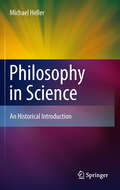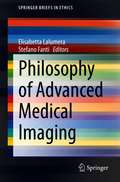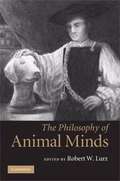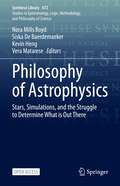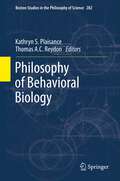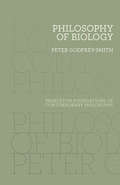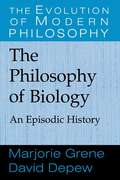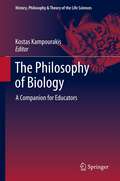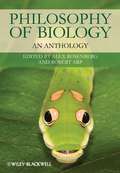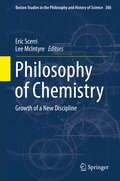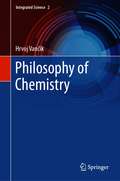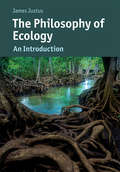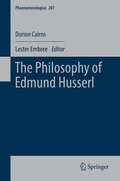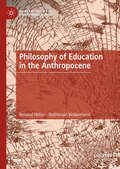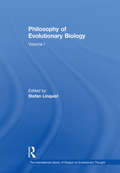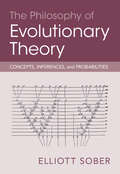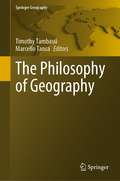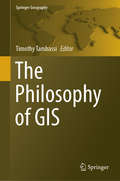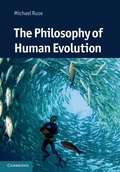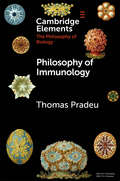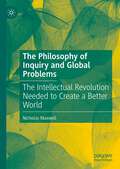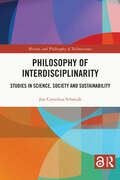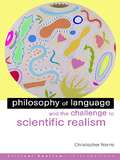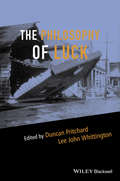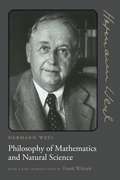- Table View
- List View
Philosophy in Science
by Michael HellerThe traditional topics of the "philosophy of nature" -- space, time, causality, the structure of the universe -- are overwhelmingly present in our modern scientific theories. This book traces the complex paths that discussion of these topics has followed, from Plato and Aristotle, through Descartes, Leibniz, Kant and other great thinkers, right up to the relativistic cosmologies and the grand unified theories of contemporary science. In the light of this historical development, it becomes clear that modern science gives us not only a technological power over the world, but also a deeper understanding of physical reality. In this sense, science could be regarded as an heir to the traditional "philosophy of nature". Moreover, the reader will learn why science itself deserves to be the subject of philosophical reflection.
Philosophy of Advanced Medical Imaging (SpringerBriefs in Ethics)
by Elisabetta Lalumera Stefano FantiThis is the first book to explore the epistemology and ethics of advanced imaging tests, in order to improve the critical understanding of the nature of knowledge they provide and the practical consequences of their utilization in healthcare. Advanced medical imaging tests, such as PET and MRI, have gained center stage in medical research and in patients’ care. They also increasingly raise questions that pertain to philosophy: What is required to be an expert in reading images? How are standards for interpretation to be fixed? Is there a problem of overutilization of such tests? How should uncertainty be communicated to patients? How to cope with incidental findings? This book is of interest and importance to scholars of philosophy of medicine at all levels, from undergraduates to researchers, to medical researchers and practitioners (radiologists and nuclear physicians) interested in a critical appraisal of the methodology of their discipline and in the ethical principles and consequences of their work.
The Philosophy of Animal Minds
by Robert W. LurzThis volume is a collection of fourteen new essays by leading philosophers on issues concerning the nature, existence, and our knowledge of animal minds. The nature of animal minds has been a topic of interest to philosophers since the origins of philosophy, and recent years have seen significant philosophical engagement with the subject. However, there is no volume that represents the current state of play in this important and growing field. The purpose of this volume is to highlight the state of the debate. The issues which are covered include whether and to what degree animals think in a language or in iconic structures, possess concepts, are conscious, self-aware, metacognize, attribute states of mind to others, and have emotions, as well as issues pertaining to our knowledge of and the scientific standards for attributing mental states to animals.
Philosophy of Astrophysics: Stars, Simulations, and the Struggle to Determine What is Out There (Synthese Library #472)
by Nora Mills Boyd Siska De Baerdemaeker Kevin Heng Vera MatareseThis is an open access book. This book, the first edited collection of its kind, explores the recent emergence of philosophical research in astrophysics. It assembles a variety of original essays from scholars who are currently shaping this field, and it combines insightful overviews of the current state of play with novel, significant contributions. It therefore provides an ideal source for understanding the current debates in philosophy of astrophysics, and it offers new ideas for future cutting-edge research. The selection of essays offered in this book addresses methodological and metaphysical questions that target a wide range of topics, including dark matter, black holes, astrophysical observations and modelling.The book serves as the first standard resource in philosophy of astrophysics for all scholars who work in the field and want to expand or deepen their knowledge, but it also provides an accessible guide for all those philosophers and scientists who are interested in getting a first, basic understanding of the main issues in philosophy of astrophysics.
Philosophy of Behavioral Biology
by Kathryn S. Plaisance Thomas A.C. ReydonThis volume provides a broad overview of issues in the philosophy of behavioral biology, covering four main themes: genetic, developmental, evolutionary, and neurobiological explanations of behavior. It is both interdisciplinary and empirically informed in its approach, addressing philosophical issues that arise from recent scientific findings in biological research on human and non-human animal behavior. Accordingly, it includes papers by professional philosophers and philosophers of science, as well as practicing scientists. Much of the work in this volume builds on presentations given at the international conference, "Biological Explanations of Behavior: Philosophical Perspectives", held in 2008 at the Leibniz Universität Hannover in Germany. The volume is intended to be of interest to a broad range of audiences, which includes philosophers (e.g., philosophers of mind, philosophers of biology, and metaethicists), as well as practicing scientists, such as biologists or psychologists whose interests relate to biological explanations of behavior.
Philosophy of Biology (Princeton Foundations of Contemporary Philosophy #8)
by Peter Godfrey-SmithAn essential introduction to the philosophy of biologyThis is a concise, comprehensive, and accessible introduction to the philosophy of biology written by a leading authority on the subject. Geared to philosophers, biologists, and students of both, the book provides sophisticated and innovative coverage of the central topics and many of the latest developments in the field. Emphasizing connections between biological theories and other areas of philosophy, and carefully explaining both philosophical and biological terms, Peter Godfrey-Smith discusses the relation between philosophy and science; examines the role of laws, mechanistic explanation, and idealized models in biological theories; describes evolution by natural selection; and assesses attempts to extend Darwin's mechanism to explain changes in ideas, culture, and other phenomena. Further topics include functions and teleology, individuality and organisms, species, the tree of life, and human nature. The book closes with detailed, cutting-edge treatments of the evolution of cooperation, of information in biology, and of the role of communication in living systems at all scales.Authoritative and up-to-date, this is an essential guide for anyone interested in the important philosophical issues raised by the biological sciences.
The Philosophy of Biology: An Episodic History
by Marjorie Grene David DepewIs life different from the non-living? If so, how? And how, in that case, does biology as the study of living things differ from other sciences? These questions are traced through an exploration of episodes in the history of biology and philosophy. The book begins with Aristotle, then moves on to Descartes, comparing his position with that of Harvey. In the eighteenth century the authors consider Buffon and Kant. In the nineteenth century the authors examine the Cuvier-Geoffroy debate, pre-Darwinian geology and natural theology, Darwin and the transition from Darwin to the revival of Mendelism. Two chapters deal with the evolutionary synthesis and such questions as the species problem, the reducibility or otherwise of biology to physics and chemistry, and the problem of biological explanation in terms of function and teleology. The final chapters reflect on the implications of the philosophy of biology for philosophy of science in general.
The Philosophy of Biology
by Kostas KampourakisThis book brings together for the first time philosophers of biology to write about some of the most central concepts and issues in their field from the perspective of biology education. The chapters of the book cover a variety of topics ranging from traditional ones, such as biological explanation, biology and religion or biology and ethics, to contemporary ones, such as genomics, systems biology or evolutionary developmental biology. Each of the 30 chapters covers the respective philosophical literature in detail and makes specific suggestions for biology education. The aim of this book is to inform biology educators, undergraduate and graduate students in biology and related fields, students in teacher training programs, and curriculum developers about the current state of discussion on the major topics in the philosophy of biology and its implications for teaching biology. In addition, the book can be valuable to philosophers of biology as an introductory text in undergraduate and graduate courses.
Philosophy of Biology: An Anthology
by Alex Rosenberg Robert ArpBy combining excerpts from key historical writings with editors' introductions and further reading material, Philosophy of Biology: An Anthology offers a comprehensive, accessible, and up-to-date collection of the field's most significant works. Addresses central questions such as 'What is life?' and 'How did it begin?', and the most current research and arguments on evolution and developmental biology Editorial notes throughout the text define, clarify, and qualify ideas, concepts and arguments Includes material on evolutionary psychology and evolutionary developmental biology not found in other standard philosophy of biology anthologies Further reading material assists novices in delving deeper into research in philosophy of biology
Philosophy of Chemistry
by Eric Scerri Lee McintyreThis volume follows the successful book, which has helped to introduce and spread the Philosophy of Chemistry to a wider audience of philosophers, historians, science educators as well as chemists, physicists and biologists. The introduction summarizes the way in which the field has developed in the ten years since the previous volume was conceived and introduces several new authors who did not contribute to the first edition. The editors are well placed to assemble this book, as they are the editor in chief and deputy editors of the leading academic journal in the field, Foundations of Chemistry. The philosophy of chemistry remains a somewhat neglected field, unlike the philosophy of physics and the philosophy of biology. Why there has been little philosophical attention to the central discipline of chemistry among the three natural sciences is a theme that is explored by several of the contributors. This volume will do a great deal to redress this imbalance. Among the themes covered is the question of reduction of chemistry to physics, the reduction of biology to chemistry, whether true chemical laws exist and causality in chemistry. In addition more general questions of the nature of organic chemistry, biochemistry and chemical synthesis are examined by specialist in these areas.
Philosophy of Chemistry (Integrated Science #2)
by Hrvoj VančikThis book, Philosophy of Chemistry, is dedicated to some of the general principles of philosophy of chemistry, the special branch of philosophy of science. Since the work is a collection of lectures that the Author gave at the University of Zagreb (Croatia) during the period of twenty years, the book could serve also as a university textbook in philosophy of chemistry. Philosophy of chemistry is represented through the discussion about some of the general philosophical problems such as, theory of complexity, autonomy of sciences, epistemology, falsificationism, emergence and unity of science, holism and reductionism, the problem of identity, and hierarchical structures, as well as the teleological aspects of science. The work consists from thirteen chapters where the main science-philosophical problems are represented and discussed within the historical context of the development of chemistry as a science. The book is aimed at wider academic audience interesting in the philosophy of science, and especially at university students of life sciences.
The Philosophy of Ecology: An Introduction (Cambridge Introductions to Philosophy and Biology)
by James JustusEcology is indispensable to understanding the biological world and addressing the environmental problems humanity faces. Its philosophy has never been more important. In this book, James Justus introduces readers to the philosophically rich issues ecology poses. Besides its crucial role in biological science generally, climate change, biodiversity loss, and other looming environmental challenges make ecology's role in understanding such threats and identifying solutions to them all the more critical. When ecology is applied and its insights marshalled to address these problems and guide policy formation, interesting philosophical issues emerge. Justus sets them out in detail, and explores the often ethically charged dimensions of applied ecological science, using accessible language and a wealth of scientifically-informed examples.
The Philosophy of Edmund Husserl
by Dorion Cairns Lester EmbreeThe present volume containing the dissertation of Dorion Cairns is the first part of a comprehensive edition of the philosophical papers of one of the foremost disseminators and interpreters of Husserlian phenomenology in North-America. Based on his intimate knowledge of Husserl's published writings and unpublished manuscripts and on the many conversations and discussions he had with Husserl and Fink during his stay in Freiburg i. Br. in 1931-1932 Cairns's dissertation is a comprehensive exposition of the methodological foundations and the concrete phenomenological analyses of Husserl's transcendental phenomenology.The lucidity and precision of Cairns's presentation is remarkable and demonstrates the secure grasp he had of Husserl's philosophical intentions and phenomenological distinctions. Starting from the phenomenological reduction and Husserl's Idea of Philosophy, Cairns proceeds with a detailed analysis of intentionality and the intentional structures of consciousness. In its scope and in the depth and nuance of its understanding, Cairns's dissertation belongs beside the writings on Husserl by Levinas and Fink from the same period.
Philosophy of Education in the Anthropocene (Palgrave Studies in Educational Futures)
by Renaud Hétier Nathanaël WallenhorstThis book develops a philosophy of education for the Anthropocene, proposing that we think about education in the light of contemporary bioclimatic challenges. Education is seen as the political means of choice for containing the runaway Earth system change and ensuring the sustainability of human life in society. In this book, Hétier and Wallenhorst continue their work on the biogeophysical and socio-political analysis of the Anthropocene here, tracing the path toward the re-founding of a political education to prepare students to address the greatest challenge of our time: the gradual disappearance of the bioclimatic conditions necessary for our very existence.
Philosophy of Evolutionary Biology: Volume I (The International Library of Essays on Evolutionary Thought)
by Stefan LinquistThe impact of evolutionary theory on the philosophy of science has been no less profound than its impact on the science of biology itself. Advances in this theory provide a rich set of examples for thinking about the nature of scientific explanation and the structure of science. Many of the developments in our understanding of evolution resulted from contributions by both philosophers and biologists engaging over theoretical questions of mutual interest. This volume traces some of the most influential exchanges in this field over the last few decades. Focal topics include the nature of biological functions, adaptationism as an explanatory and methodological doctrine, the levels of selection debate, the concepts of fitness and drift, and the relationship of evolutionary to developmental biology.
The Philosophy of Evolutionary Theory: Concepts, Inferences, and Probabilities
by Elliott SoberNatural selection, mutation, and adaptation are well-known and central topics in Darwin's theory of evolution and in the 20th - and 21st -century theories which grew out of it, but many other important topics are used in evolutionary biology that raise interesting philosophical questions. In this book, Elliott Sober analyses a much larger range of topics, including fitness, altruism, common ancestry, chance, taxonomy, phylogenetic inference, operationalism, reductionism, conventionalism, null hypotheses and default reasoning, instrumentalism versus realism, hypothetico-deductivism, essentialism, falsifiability, the principle of parsimony, the principle of the common cause, causality, determinism versus indeterminism, sensitivity to initial conditions, and the knowability of the past. Sober's clear philosophical analyses of these key concepts, arguments, and methods of inference will be valuable for all readers who want to understand evolutionary biology in both its Darwinian and its contemporary forms.
The Philosophy of Geography (Springer Geography)
by Timothy Tambassi Marcello TancaThe relationship between geography and philosophy is still largely in need of being explored. Geographers and philosophers share the responsibility for that. On the one hand, geographers have considered as a dangerous deviation any attempt to elaborate an image of the Earth which was not a mere replica of a cartographic representation. On the other hand, philosophers have generally been uninterested in a discipline offering little chance for critical reflection. In light of these considerations, the purpose of this book is to identify some fundamental philosophical issues involved in the reflection of geography by adopting a perspective which looks at the discipline with a specific focus on its fundamental concepts and distinctions.
The Philosophy of GIS (Springer Geography)
by Timothy TambassiThis anthology aims to present the fundamental philosophical issues and tools required by the reflection within and upon geography and Geographic Information Systems (GIS) . It is an introduction to the philosophy for GIScience from an analytical perspective, which looks at GIS with a specific focus on its fundamental and most general concepts and distinctions. The first part of the book is devoted to explore some of the main philosophical questions arising from GIS and GIScience, which include, among others, investigations in ontology, epistemology, linguistics and geometrical modeling. The second part concerns issues related to spatial and cartographical representations of the geographical world. The third part is focused on the ontology of geography, specifically in terms of geographical entities, objects and boundaries. Finally, in the fourth part, the topic of GIS constitutes a starting point for exploring themes such as quantum geography and disorientation, and for defining professional profiles for geographers with competences in GIS environment. This book on a new and unexplored field of research could be a fundamental point of reference for professional philosophers and geographers interested in the theoretical reflection about the foundational concepts of GIScience. It is also interesting reading material for students (both undergraduates, postgraduates and Ph.D. students) in philosophy, geography, applied ontology, GIScience, geomatics and computer science.
The Philosophy of Human Evolution
by Michael RuseThis book provides a unique discussion of human evolution from a philosophical viewpoint, looking at the facts and interpretations since Charles Darwin's The Descent of Man. Michael Ruse explores such topics as the nature of scientific theories, the relationships between culture and biology, the problem of progress and the extent to which evolutionary issues pose problems for religious beliefs. He identifies these issues, highlighting the problems for morality in a world governed by natural selection. By taking a philosophical viewpoint, the full ethical and moral dimensions of human evolution are examined. This book engages the reader in a thorough discussion of the issues, appealing to students in philosophy, biology and anthropology.
Philosophy of Immunology (Elements in the Philosophy of Biology)
by Thomas PradeuImmunology is central to contemporary biology and medicine, but it also provides novel philosophical insights. Its most significant contribution to philosophy concerns the understanding of biological individuality: what a biological individual is, what makes it unique, how its boundaries are established and what ensures its identity through time. Immunology also offers answers to some of the most interesting philosophical questions. What is the definition of life? How are bodily systems delineated? How do the mind and the body interact? In this Element, Thomas Pradeu considers the ways in which immunology can shed light on these and other important philosophical issues. This title is also available as Open Access on Cambridge Core.
The Philosophy of Inquiry and Global Problems: The Intellectual Revolution Needed to Create a Better World
by Nicholas MaxwellUniversities have long been dominated by a philosophy of inquiry that may be called knowledge-inquiry. This holds that, in order to do justice to the basic humanitarian aim of helping to promote human welfare, academic inquiry must, in the first instance, seek knowledge and technological know-how. First, knowledge is to be acquired; once acquired, it can be applied to help promote human welfare. But this philosophy of knowledge-inquiry is an intellectual and humanitarian disaster. It violates three of the four most elementary rules of rational problem solving conceivable, and as a result fails to give priority to the task of helping humanity resolve those conflicts and problems of living, such as the climate and nature crises, that need to be resolved if we are to make progress to a better world – a world in which there is peace, democracy, justice, liberty, and sustainable prosperity, for all. Very few academics today are aware of this rationality scandal. We urgently need to bring about a revolution in universities around the world, wherever possible, so that academic inquiry puts all four rules of rational problem solving into practice, and becomes rationally devoted to helping humanity learn how to make progress towards a better world. Knowledge-inquiry needs to become wisdom-inquiry, rationally devoted to helping humanity create a wiser world.
Philosophy of Interdisciplinarity: Studies in Science, Society and Sustainability (History and Philosophy of Technoscience)
by Jan Cornelius SchmidtInterdisciplinarity is a hallmark of contemporary knowledge production. This book introduces a Philosophy of Interdisciplinarity at the intersection of science, society and sustainability. In light of the ambivalence of the technosciences and the challenge of sustainable development in the Anthropocene, this engaged philosophy provides a novel critical perspective on interdisciplinarity in science policy and research practice. It draws upon the original spirit of interdisciplinarity as an environmentalist concept and advocates an essential change in human-nature relations. The author utilizes the rich tradition of philosophy for case study analysis and develops a framework to disentangle the various forms of inter- and transdisciplinarity. Philosophy of Interdisciplinarity offers a foundation for a critical-reflexive program of interdisciplinarity conducive to a sustainable future for our knowledge society and contributes to fields such as sustainability sciences, social ecology, environmental ethics, technology assessment, complex systems, philosophy of nature, and philosophy of science. It injects a fresh way of thinking on interdisciplinarity – and supports researchers as well as science policy makers, university managers, and academic administrators in critical-reflexive knowledge production for sustainable development.
Philosophy of Language and the Challenge to Scientific Realism (Routledge Studies in Critical Realism)
by Christopher NorrisIn this book Christopher Norris develops the case for scientific realism by tackling various adversary arguments from a range of anti-realist positions. Through a close critical reading he shows how they fail to make adequate sense on any rational, consistent, and scientifically-informed survey of the evidence. Along the way he incorporates a number of detailed case-studies from the history and philosophy of science. Norris devotes much of his discussion to some of the most prominent and widely influential source-texts of anti-realism. Also included are the sophisticated versions of verificationism developed - albeit in very different ways - by thinkers such as Michael Dummett and Bas van Fraassen. Central to Norris's argument is a prolonged engagement with the once highly influential but nowadays neglected work of Norwood Russell Hanson. This book will be welcomed especially by readers who possess some knowledge of the background debate and who wish to deepen and extend their understanding of these issues beyond an introductory level.
The Philosophy of Luck (Metaphilosophy)
by Duncan Pritchard Lee John WhittingtonThis is the first volume of its kind to provide a curated collection of cutting-edge scholarship on the philosophy of luck Offers an in-depth examination of the concept of luck, which has often been overlooked in philosophical study Includes discussions of luck from a range of philosophical perspectives, including ethics, epistemology, metaphysics, and cognitive science Examines the role of luck in core philosophical problems, such as free will Features work from the main philosophers writing on luck today
Philosophy of Mathematics and Natural Science
by Hermann WeylWhen mathematician Hermann Weyl decided to write a book on philosophy, he faced what he referred to as "conflicts of conscience"--the objective nature of science, he felt, did not mesh easily with the incredulous, uncertain nature of philosophy. Yet the two disciplines were already intertwined. In Philosophy of Mathematics and Natural Science, Weyl examines how advances in philosophy were led by scientific discoveries--the more humankind understood about the physical world, the more curious we became. The book is divided into two parts, one on mathematics and the other on the physical sciences. Drawing on work by Descartes, Galileo, Hume, Kant, Leibniz, and Newton, Weyl provides readers with a guide to understanding science through the lens of philosophy. This is a book that no one but Weyl could have written--and, indeed, no one has written anything quite like it since.
